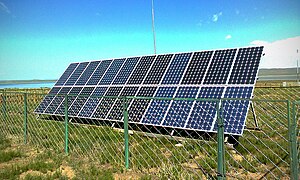Wikijunior:How Things Work/Solar panel

A solar panel converts the power of the sun into either electricity (where it is called 'photovoltaic') or heat (where it is called 'solar thermal').
Who invented it?
editCurrently it is unknown who invented the solar cell, but it was invented in Germany.
How does it get power?
editSolar panels get their power from the sun. That is why they are called 'solar' panels because solar means sun in Latin.
How does it work?
editIt transforms solar power into regular electricity using the photovoltaic effect. The photovoltaic effect is when light excites electrons in the material to a higher energy state, producing energy.
How dangerous is it?
editIt is not very dangerous, but if you look at it too long, the reflected sunlight could damage your eyes. Also, solar panels can get very hot in summer, especially solar thermal ones.
What does it do?
editIt transforms power from light into regular electricity in large amounts usually (as there are small solar cells too). It contains lots of solar cells that do this.
How does it vary?
editSolar power is a source of clean energy. By covering just 2% of the Earth's surface, solar panels could provide enough energy for the current needs of the whole planet. Doing so could cause other problems, however, like reducing the amount of land for growing food.
What idea(s) and/or inventions had to be developed before it could be created?
editHow much does it cost?
editSolar panels are currently selling for as low as US$0.70 per watt in 7-April-2012 in industrial quantities;.[1][2]
References
edit- ↑ Harnessing Light. National Research Council. 1998. p. 162.
- ↑ Paula Mints (24 September 2009). "Module Pricing: Rational, Or Just Plain Nuts?". Photovoltaics World Magazine.